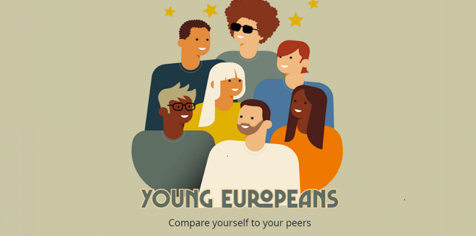A sharing awareness is that the last years were very challenging and difficult, especially for young people. The Covid 19 pandemic came out of the blue and was upsetting for everyone; it changed our lives, our habits, imposing the social distance and stopping most of the world economy. But are we sure that it was really out of the blue? Perhaps a more accurate view is that the pandemic has only brought to light the structural problems that have long laid in Europe’s social and economic structures, especially in some of its countries, and, at the same time, has accelerated some of the disastrous consequences of these problems.
One of the main issues that emerged is the one linked to the (un)employment. Most of today’s young Europeans are the heirs of a generation that has largely experienced the positive effects of the post-war economic boom. Surely this was a huge advantage, but it also contributed to develop a culture of “doing better, doing more”. This idea, of course, is not sustainable in a long time. It requires too much effort and ends up creating counterproductive effects for the whole society. Especially in the job market this way of thinking is disruptive because it links an individual and active effort to the external conditions and economic dynamics. This relationship is more destructive as external reality presents prolonged periods of crisis, as was the case with the economic crisis of 2008.
Nowadays we are facing one of the highest youth unemployment rates in the history of Europe, especially in the 18 YE Fund’s beneficiary Countries. For this reason, in the last years one of the main priorities of European Union’s policies is the promotion and the support of young human capital, introduced by the 20 key principles and rights of European Pillar of Social Rights for fair and well-functioning labour markets and social protection systems. In October 2020, to face the challenges posed by Covid-19 pandemic, all EU countries have committed to the implementation of the reinforced Youth guarantee in a Council Recommendation which deals with the job support to young people across the EU, making it more targeted and inclusive.
In the evaluation linked to the ROM (Results Oriented Monitoring) activity that it has been done with the YE Fund Projects, it has been observed that in most of the European countries there is a common line linked to the youth unemployment issue. This is represented in the younger shares of the population by the lack of trust not only towards themselves but also towards the job market and the institutions in general, both public and private. The fact that this is a transversal phenomenon, could be more likely addressed to a social generational issue rather than to the specific political laws and decisions. In fact, Millennials and Z Generation are now facing all the political and economic changes incurred since the Twin Towers fall in 2001, 2008 financial crisis, the Covid-19, and, finally, the more recent war in Ukraine.
In particular, the Covid-19 crisis has made these economic and political problems even more urgent and worrying for young people due to the prolonged isolation and the lack of social interactions, with many of them experiencing anxiety and psychological problems, and being exposed to stressful home environments, with heavy consequences on their motivation and overall emotional well-being. This unwellness, combined with a more structural problem linked to the shrinking opportunities available in the labour market, leads young people to experience behavioral disorders and bad habits, thus creating a vicious and dangerous circle from which it is difficult to get out after a prolonged period.
In this context, the role of EU institutions could be crucial and give guidance, making their voice heard in the European Year of Youth. The European Union is (from many years) dedicated to improving the mental health of people and support national policies related to this issue, focusing on the needs and priorities of EU countries towards different initiatives and programs, such as Joint Action ImpleMental, InvestEU and EU4Health Promoting Mental Health Programmes.
But could we do more? Perhaps a possible solution would be to support young people with a psychological expert throughout the last years of the educational path, to prepare and, at the same time, support youngsters during the delicate phase of adolescence. In addition, this support would help to fill one of the main structural problems encountered in the labour market, namely the gap between the demand for skills and the supply of human capital. In fact, the profile of a counselor in schools and in educational social centers could help young people to have a greater awareness of their skills and competences and, more widely, of their identity, thus providing the essential bases to be able to face the transition from the academic to the professional world, with the related consequences that this would have on the labour market.
The path is still long, and many others changes and challenges are in the horizon, but our society as a whole and European institutions have the responsibility to try to improve young people current conditions, because the youth generation represents the future and the progress of our society, and we can’t miss the chance to help and support them in the construction of the new world’s asset. And this is the core idea behind many of our Youth Employment projects that every day, supported by EEA Norway Grants, give their contribution in solving this current youth generational issue with commitment and dedication.
Sources:
Youth unemployment – Statistics Explained (europa.eu)
How much do you know about mental health? | European Youth Portal (europa.eu)
What is the European Year of Youth? | European Youth Portal (europa.eu)


